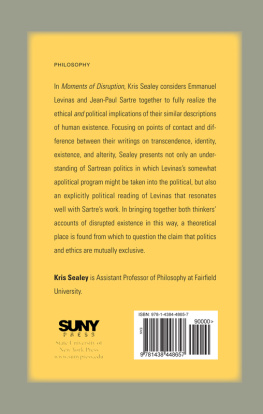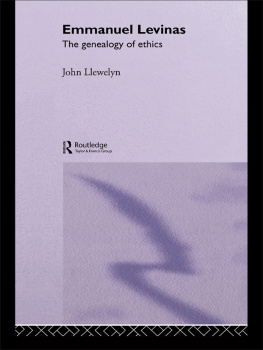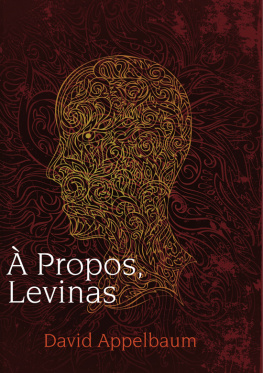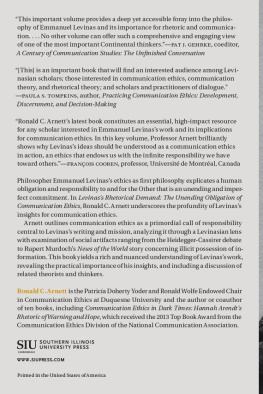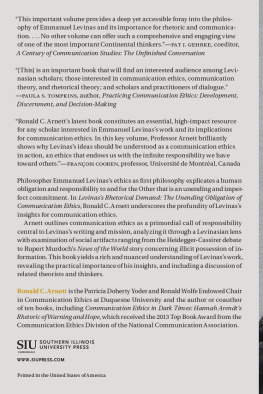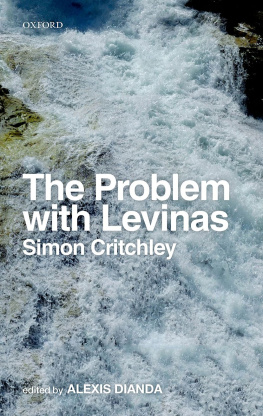Moments of Disruption
Moments of Disruption
Levinas, Sartre, and the
Question of Transcendence
KRIS SEALEY
Cover image: Rupture of Selfhood by Frankie Frieri
Published by State University of New York Press, Albany
2013 State University of New York
All rights reserved
Printed in the United States of America
No part of this book may be used or reproduced in any manner whatsoever without written permission. No part of this book may be stored in a retrieval system or transmitted in any form or by any means including electronic, electrostatic, magnetic tape, mechanical, photocopying, recording, or otherwise without the prior permission in writing of the publisher.
For information, contact State University of New York Press, Albany, NY
www.sunypress.edu
Production by Eileen Nizer
Marketing by Fran Keneston
Library of Congress Cataloging-in-Publication Data
Sealey, Kris,
Moments of disruption : Levinas, Sartre, and the question of transcendence / Kris Sealey.
pages cm
Includes bibliographical references and index.
Summary: Ethical and political implications of Levinas and Sartres accounts of human existenceProvided by publisher.
ISBN 978-1-4384-4865-7 (alk. paper)
1. Lvinas, Emmanuel. 2. Sartre, Jean-Paul, 19051980. 3. Transcendence (Philosophy) I. Title.
B2430.L484S44 2013
194dc23
2013000131
10 9 8 7 6 5 4 3 2 1
In loving memory of my father, Curtis Sealey,
the first to teach me the value of a sound argument
And for little Isaiah, my rock and my light
Contents
Chapter 1
The Role of Being in Sartres Model of Transcendence-as-Intentionality
Chapter 2
Positionality in Levinass Transcendence-as-Excendence
Chapter 3
Levinasian Positionality in Sartres Account of Nausea
Chapter 4
Levinasian Positionality Implicit Sartres Affective Experiences
Chapter 5
Levinas and Sartre on the Question of the Other
Acknowledgments
An earlier version of of this work also appeared in Research in Phenomenology 40, no. 3 (2010), under the title The Primacy of Disruption in Levinas Account of Transcendence. My thanks go out to Brill for allowing me to use this work here. For the cover art of this book, I acknowledge Mr. Frankie Frieri. His tremendous talent and unwavering patience materialized the imagery that captures this books title. I am grateful that our paths happened to cross at the precise moment they did.
My dissertation research at The University of Memphis provided the groundwork for this book. As such, I owe much gratitude to the members of my dissertation committee: Robert Bernasconi, Bill E. Lawson, Mary Beth Mader, and Tom Nenon all provided the careful guidance and honest criticism that made that work (and ultimately, this book) possible.
This project began as a twenty-five minute conference presentation at the 2003 meeting of the North American Sartre Society, at Purdue University. Those arduous twenty-five minutes, as well as the following nine years it took for that paper to grow into the book before you, would have ended quite differently was it not for the unequivocal support, mentorship, and tough love of Robert Bernasconi. He has been with me during the entire journey of this book, as an interlocutor, mentor, and friend. Quite arguably, I would not have pursued a degree in philosophy without his quiet intervention, and I owe much of my growth as a scholar to his presence in my life. Words cannot express my gratitude for his time, patience, and careful analysis of numerous drafts of these chapters.
Thanks are also due to Roy Martinez, who, on explaining what SPEP (Society for Phenomenology and Existentialist Philosophy) meant, convinced me to at least think about pursuing philosophy as an undergraduate at Spelman College. The thought of sending him a copy on completion of this book (signed, like the signed copy of his Kierkegaard and the Art of Irony he gave me some thirteen years ago) thrilled me to no end. I was deeply saddened to know about Dr. Martinezs passing in 2009. The memory of his encouragement and mentoring, during my intellectual search at Spelman College, often gave me strength to continue writing the chapters of this book.
During the last six years as an assistant professor at Fairfield University, I received tremendous support in writing this book. The support from the College of Arts and Sciences, as well as the Department of Philosophy, made it possible for me to conduct much of the research that went into this project. Our administrative assistants, Charlene Wallace and Joan Huvane, were tremendously helpful throughout. Im also grateful to the current Chair of our department, Steven Bayne, for his support and guidance. I am particularly indebted to Dennis Keenan, whose invaluable feedback on drafts of my work opened up the trajectory of this project in ways I could never have anticipated. Our many conversations about the role of impersonal existence in Emmanuel Levinass early work has shaped my own reading of Levinass work. This is abundantly clear in the following chapters. I thank him for this insight, and for the hand of genuine friendship that he and his wife, Liz, have extended to my family and me. I am also thankful for Fairfield Universitys Robbin Crabtree, Sara Brill, Joy Gordon, Jocelyn Boryczka, Gwen Alphonso, Marcie Patton, Sonya Huber, Anna Lawrence, and Emily Orlando. Their superhuman intelligence and academic productivity continues to elevate the bar of scholarly excellence.
Many professional organizations and institutions have made the completion of this project possible. I am grateful for the financial support of the Department of Philosophy and the Rock Ethics Institute at Penn State University. Their Anna Julia Cooper Writing Fellowship provided me with the resources (and sanctity) needed to complete the last and most formative chapter of this work. During my week at Penn State, I received feedback from a caring and critical audience of professors and graduate students. In particular, I am grateful to Vincent Colapietro, Shannon Sullivan, Nancy Tuana, and Michael Paradiso-Michau. Graduate students like Axelle Karera and Ayesha Abdullah took time out of there insanely busy schedules to share their thoughts on my research, and for this I am extremely grateful. The North American Sartre Society, the North American Levinas Society, and the Collegium of Black Women Philosophers also provided the stage that ultimately shaped his project into its final form. Over the years, elements of this book were presented at various meetings of all three conferences, and I have benefited from the engagement with scholars in these organizations. I am especially grateful to Drew Dalton for his advice and camaraderie during the 2008 North American Levinas Society meeting at Seattle University. John Drabinskis unwavering support has also been nothing short of lifesaving during the process of writing this book. I am also thankful for women like Kathryn Gines, Donna-Dale Marcano, Anika Simpson, Kristie Dotson, Rozena Maart, and Nathifa Greene, who all give me inspiration during our time together every April at the Collegium. Quite recently, Ive also been fortunate enough to know Linda Martin Alcoff. As a friend, mentor, and source of support, she has enriched my life in many ways.

